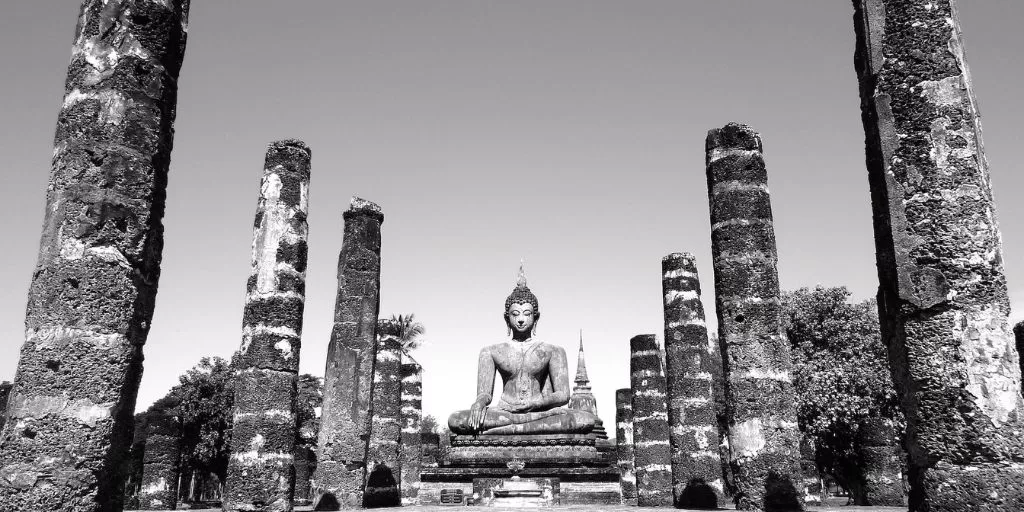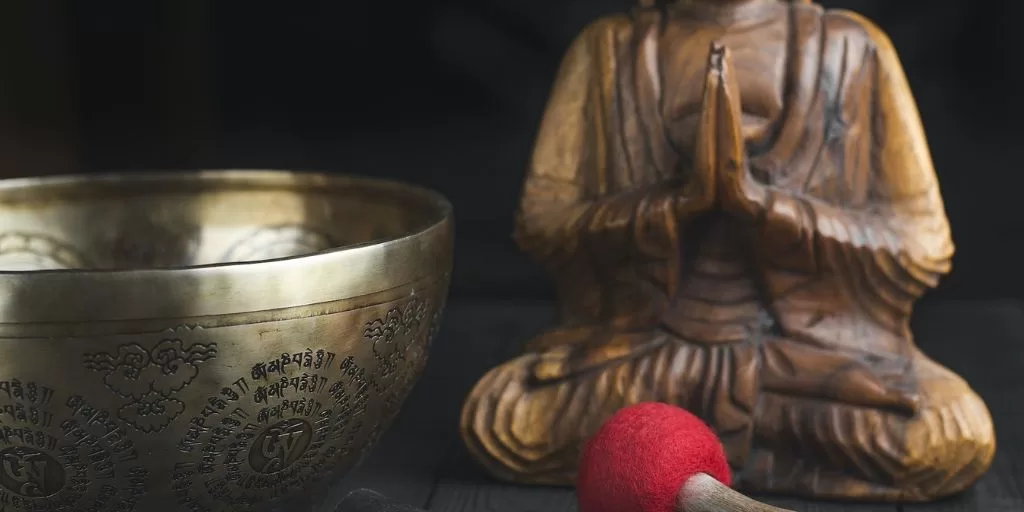Meditation is an ancient practice that people have used for a long time to seek inner peace and understanding. It is the conscious pursuit of a calmer, more focused state of being by clearing the mind and deepening awareness. It provides a moment for stillness and contemplation, allowing us to access our inner wisdom. What meditation means is something unique to each person who practices it – it could be a time for reflection, mind-body integration, or exploring spiritual concepts – yet all these variations have one thing in common: they offer an opportunity to find greater clarity within ourselves. From this place of increased awareness, we can gain insight into our emotions and behaviors which may otherwise remain hidden from our conscious minds. Meditation can help to reduce stress levels while increasing alertness, concentration, creativity, and overall well-being.
The beauty of meditation lies in its ability to connect us with our inner world; it creates a connection between our physical body and spiritual being that helps us learn more about ourselves as we age.
Table of Contents
Definition of Meditation
Meditation is a practice that has been used for millennia to bring about physical, mental, and emotional health. It is a tool that is often used for relaxation, reflection, and introspection that can be used in many different ways. To understand what meditation means, it is essential to look at the origins of the practice and its various forms. The history of meditation dates back thousands of years, originating in ancient Eastern cultures such as Buddhism and Hinduism. The goal was to seek inner peace through mindfulness and self-awareness. Today, meditation encompasses a wide range of practices from guided meditations to silent contemplation to mindful movements such as yoga or tai chi. Each form can help bring clarity of thoughts, reduce stress levels, and improve overall well-being by providing an opportunity for self-reflection and contemplation on one’s life path.
To define meditation in one sentence, one could say that meditation is a form of deep concentration used usually with the aim to cultivate inner focus (although not always). Meditation is a form of mental training. It can be used for several purposes depending on the form used but what connects all forms of this mental practice is the fact that it is being exercised with the help of the mind rather than muscles.
What Meditation Means to Me?
To me, meditation means is more than just a calming practice. It is a way of being, an experience of connection and contentment. Meditation has taught me how to be in the moment and find peace right where I am. It has helped me learn to trust my own inner wisdom and find solace in silence. When I meditate, I feel like I enter my own personal oasis – an escape from the chaos of everyday life. In this sacred space, I am able to access a deeper level of truth within myself and gain clarity into what truly matters in life. Through meditation, I have been able to embrace my spiritual side and connect with something greater than myself; something that exists beyond the physical world we inhabit. Meditation has taught me how to slow down and take a moment away from the distractions of life. When I meditate, I feel like I enter a sacred space which helps me to recover and improve my concentration.
I often use meditation for decision-making purposes as it enables me to quiet down my mind and learn how to follow logic instead of emotions. It also allows me to see things how they really are, free of judgment, attachment, and excessive analysis. I consider meditation as a way of connecting with the inner wisdom that helps me make wiser choices in life.
A Brief History of Meditation

Throughout history, meditation has been practiced as a means of calming the mind and achieving inner peace. Some say that meditation originates from India over 3,000 years ago and it was initially used by Hindu monks and yogis to help them attain spiritual enlightenment, but other sources confirm that this ancient practice was present long before that. While typically meditation is associated with Eastern religions, meditation is actually a universal practice that transcends cultural boundaries. During its evolution, many different approaches developed across the world – from Native American “dream catchers” to Japanese Zen Buddhism.
Meditation has also been used by warriors since the beginning of time. From the samurai of ancient Japan to the Vikings of Scandinavia, meditation was an integral part of their training regimes. It gave them focus, clarity, and discipline in their battles and enabled them to reach a level of heightened awareness that could give them the edge in combat. Kung fu masters, ninja warriors, muay thai fighters, and even barbarians all relied on meditation as a way to strengthen their bodies and minds so they could face opponents with confidence. It allowed them to enter into an altered state of consciousness where they could perceive more than ever before, calculate every move and be calm under pressure. The power gained from meditating can never be underestimated; it can truly give warriors an advantage in any situation. Regardless of the method employed, all forms of meditation share a common goal: to enhance mental clarity and cultivate inner calm through focused attention and awareness. By allowing us to become more aware of our thoughts and feelings, meditation allows us to make conscious choices about how we respond rather than being reactive or impulsive in our actions.
Benefits of Meditation
Meditation is a versatile tool that offers numerous benefits for both physical and mental health. It has been used for millennia as a way to help reduce stress, improve concentration, and increase self-awareness. The practice of meditation can also bring more joy and peace into your life by allowing you to take the time and space to connect with yourself in meaningful ways. One of the most beneficial aspects of meditation is its ability to reduce stress levels. When we meditate, our body relaxes physically and mentally, allowing us to let go of any tension we may be holding onto due to various external factors. Through regular practice, we can learn how to respond better in stressful situations by taking deep breaths, grounding ourselves in the present moment, and responding calmly instead of panicking or getting overwhelmed. Meditation can also help enhance our cognitive skills such as memory, focus, task-processing speed, and overall attention. In addition, studies have shown that meditation may help reduce the risk of certain health conditions such as heart disease and depression. For instance, I’ve been practicing meditation for over 20 years now and I can notice its profound effects of it on my daily life. In the beginning, I found it to be challenging to sit still and quiet my mind, but the more I practiced, the easier it became.
Here’s a brief list of benefits that meditation offers:
- Improved cognitive skills
- Increased self-awareness
- Improvements in emotional control
- Enhanced self-management skills
- More peaceful mindset and enhanced sense of inner peace
- Reduced stress levels
- Increased life satisfaction
- Reduced feelings of loneliness
- Decreased anxiety, depression, and irritability
All in all, meditation is a great way to help improve your health mentally and physically.
Why Should You Meditate?
One of the most powerful reasons to meditate is its ability to bring calmness into your life. It reduces stress by quieting the mind, allowing you access to a deep state of relaxation. When you’re in this relaxed state, your mind becomes sharper and more alert, allowing you to better cope with challenging situations such as work deadlines or family conflicts. In addition, meditation helps increase feelings of joy and contentment, making life more enjoyable overall. Meditation also has an extraordinary impact on physical health as well. It helps the mind and body heal themselves by reducing stress, anxiety, and depression. This not only makes you feel better but also lowers blood pressure, improves sleep quality, and boosts your immune system. It even helps reduce chronic pain by increasing the level of endorphins in the brain.
To be honest, I could go on and on about the benefits of meditation but I don’t want to bore you with all the scientific studies that have been done in this regard. So I’ll explain this quickly – to put it simply, meditation can boost your physical and mental health as well as cognitive abilities and (if you’re advanced enough) allow you to control the physiology of your body through advanced meditative practices.
Different Types of Meditation

The practice of meditation has grown to become a very popular way to reduce stress and increase mindfulness. There are a variety of types of meditation available, from classic practices like Zen meditation and vipassana to more modern methods such as mindfulness meditation and transcendental meditation. Each type of meditation offers its own unique benefits for the mind and body. Zen meditation is one of the most traditional forms, which focuses on non-reactive awareness through basic techniques such as breath counting. This practice encourages mindful observation that can lead to increased mental clarity, improved concentration levels, and better overall well-being. Vipassana is another form of classical meditation that involves focusing attention on bodily sensations while avoiding judgment or interpretation. The goal is to experience each moment with complete presence and acceptance by cultivating insight into physical experience in order to gain greater control over thoughts and emotions.
How to Start Practicing Meditation?
There are various forms of meditation, but for those seeking to start an introductory practice, basic meditation provides an excellent place to begin. To meditate, it is important first to find a comfortable space where you will not be disturbed. It is beneficial to have something such as comfortable pillows or cushions that help create ease in the body when sitting for an extended period of time. Once settled into your position and environment, focus your attention on either your breath or body sensations; this will help form a presence in the present moment by slowing down internal chatter. At times, you may experience thoughts and feelings that distract you from your meditation. The key is to learn to let go of the distraction and return to your chosen focus point.
You can also try guided meditation – this is a form of relaxation that involves listening to the voice of another person as they verbally guide you through a series of steps designed to assist you in becoming more relaxed. All you have to do is listen to their voice and follow their instructions. You can experience the benefits of guided meditation without the need for prior practice as all the essential directives are provided by the instructor.
Guided Meditation for Busy People
Meditation has long been promoted as a means of improving mental and physical well-being, but for busy people, it can seem like an impossible task to fit into a day already packed with responsibilities. However, guided meditation may be the perfect solution for those who are feeling overwhelmed by their lives. Guided meditation is different than traditional meditation in that it involves verbal guidance from someone else rather than simply allowing the mind to wander. This makes it easier to focus and achieve a relaxed state since someone is providing instruction on how best to do so. The benefits of guided meditation are numerous. It helps create mindfulness which fosters greater self-awareness and clarity of thought; this allows people to handle stress and anxiety in their daily life. Additionally, regular practice can offer relief from physical ailments such as headaches or insomnia as well as improve mental alertness and concentration levels throughout the day.
Tips for Getting Started with Meditation
It can be difficult to know how to get started with meditation, especially if you are a beginner. Here are some tips that may help you begin your journey into this rewarding practice. The first step when starting out with meditation is to find a suitable environment. Select a place in your home where you will feel comfortable sitting or lying down for an extended period of time without any distractions from external sources such as noise or people. Secondly, it is important to be mindful of the duration of your meditation session; beginners should start with short periods each day until they become more experienced meditators. The next step is to choose a suitable posture. You may choose to sit or lie down for your meditation session, but you should make sure that you are comfortable. Experiment with different poses until you find one that is right for you. Now comes the most important part of meditation: breathing. Simply feel it as it comes in and goes out. Observe it, and be aware of it throughout your session. If you ever feel agitated or stressed, concentrate on your breathing, and focus on the air as it flows in and out of your body. Do this until you feel calm again – deep breathing actually causes physiological changes in how your organism functions.
Conclusion: Is Meditation Worth It?

Meditation is a practice that has been around since antiquity and its purpose has changed over the years depending on who practiced it. To some, mediation means peace and harmony. It’s a state of mind where people can be still and present in the moment. It allows them to disconnect from their everyday worries and stressors so they can focus on themselves internally. Taking time out to meditate helps people feel centered which, in turn, allows them to make better decisions throughout their day-to-day life.
On the other hand, meditation can also be a spiritual practice. It’s an inner journey that allows individuals to connect with something greater than themselves and focus on the meaning of life. In a way, meditation is like a form of prayer that helps people find peace within themselves and their surroundings.
As for why you should meditate – there are countless benefits! Meditation helps reduce stress and anxiety levels; it also fosters a more positive outlook, improves sleep quality, increases concentration levels, creativity and productivity, enhances emotional intelligence, boosts confidence, and even strengthens our overall immune system.
If you want to learn more about how to meditate for beginners, read my beginner meditation guide – it’s completely free and gives a much more detailed explanation on how to meditate properly.




